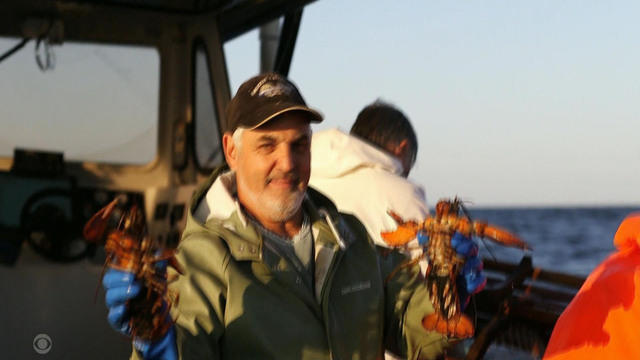▶ Watch Video: Lobster population grows amid global warming
Lobster is a $1.4 billion industry in Maine, employing more than 4,100 people directly and thousands more in related businesses. But climate change is warming the chilly Atlantic water lobsters need to thrive, prompting a marine migration to the north.
George Dowdle has been farming oysters for four decades. Lately, his operation has been booming.
“Twenty-five years ago, this time of year we were getting ready to put everything down for the winter. And by the end of November, at the very latest, we have two inches of ice and we’d be done,” Dowdle told CBS News. “Now, I’m fishing right through until January.”
Dowdle said he now has about an extra month and a half to farm his oysters.
“And a month and a half more growth time as well,” he added.
Dowdle sees the effects of a warming planet. He said in the past couple of decades, he’s watched the water temperature in the summertime rise about 10 to 15 degrees Fahrenheit, and his observations fit with the science.
A recent study shows that water temperatures in the Gulf of Maine are warming faster than 99% of the global oceans.
And it’s having an impact. Lobster catches are plummeting in Southern New England, but skyrocketing up the coast in Maine and in the Canadian Maritimes as lobsters move north in search of cooler water.
Luke Peters comes from a long line of lobstermen on Prince Edward Island. He said there are “a lot of happy fishermen around the wharf this year.”
“You’re seeing places where, historically, there wasn’t quite as many lobsters being caught … Their catches are going way up,” Peters said.
University of Prince Edward Island climate professor Adam Fenech said warming has been a win for the island’s fishing industry.
“Lobster fishermen are seeing with these warmer temperatures a great abundance of younger lobsters, so they know in the coming years that the landings are going to be continue to be large,” he said.
But that boom could quickly turn to bust.
“The temperatures are going to continue to increase,” Fenech said. “And some of the industry as we know it, both in aquaculture or other shellfish industries like lobster, they’re eventually going to disappear from this island here.”
Conditions that Dowdle said are already causing stress to his oysters.
“I get kind of worried about how it’s going to fare out in the end,” Dowdle said.
A fear he shares with many fishermen on the island.


































